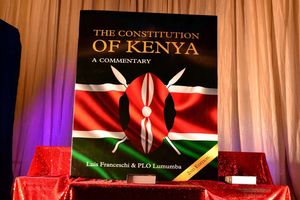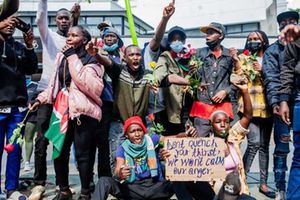
Protesters picket along Kenyatta Avenue in Nairobi on June 25, 2025.
Political revolutions and historical events can be triggered by obscure and hidden events. Those events often have a snowballing effect. A snowball effect refers to a small initial event that gradually increases in size, becoming more impactful.
One of the best historical examples of this is the trigger of World War 1. This war is remembered for its brutality and the many casualties — between 15 and 25 million by most estimates. But its settlement, in 1919 through the Treaty of Versailles, set the stage for World War 2 that killed at least 85 million humans. Therefore, over 100 million people died in both wars.
The World War 1 trigger was a seemingly innocuous event. It was the assassination of Archduke Franz Ferdinand of Austria-Hungary by a Serbian nationalist in Sarajevo on June 28, 1914. The Austria-Hungary nation had many communities, amongst them Serbians.
But Serbians were an unhappy lot in this country, wishing to secede and be aligned with the neighbouring Serbian Kingdom. Austria-Hungary would hear none of that, declaring their boundaries as inalienable.
Illegal hawking
One Serbian nationalist decided to take matters in his own hands and assassinated the royal couple of Austria-Hungary. This triggered a chain of reactions.
Mobs rioted across Austria-Hungary demanding action. The country, with German support, issued the "July Ultimatum" demanding Serbia to accept responsibility and punish those behind the assassination.
Serbia agreed to some demands but refused others. Austria-Hungary declared war on Serbia and commenced war aided by Germany. Russia came to the aid of Serbia. Germany, fearing two war fronts, attacked France for being an ally of Russia. It invaded Belgium triggering Britain to attack. This chain of triggers caused cross-country alliances, including the involvement of America.
Another example of a small trigger of a major historical event is the case of Mohammed Bouzizi, a Tunisian hawker. On December 17, 2010, Muhammad was selling his wares in Sid Bouzid, Tunisia, when municipal officers impounded them accusing him of illegal hawking. This was the usual kanjo (county askaris) harassment. As at that time, neither the kanjos nor Muhammad knew how such a routine action would trigger events of historical proportions.
Triggering protests
Muhammad was unhappy and sought redress with senior municipal officials. They refused to grant him an audience. He set himself on fire, triggering protests that toppled the government. Copycat demonstrations occurred in Egypt, Libya, Sudan and Syria, creating chaos and producing a devastating toll.
Kenyan Gen Z protests had abated after last year’s deadly violence. That was until the death of Albert Ojwang in police hands in June 2025.
Whoever ordered Ojwang’s arrest never foresaw how it could trigger a systematic chain of reactions that followed. A protest in Nairobi then led to the shooting by police of Boniface Kariuki, a hawker in Nairobi. This in turn triggered bigger demonstrations on June 25, which marked the one-year anniversary of the Gen Z protests. And the deadly commemoration events that followed have given rise to indications of Saba Saba protests.
The lessons of history demand that those in authority should exercise extra caution. Much power has been given to them by law, including a monopoly of legitimate violence. But power carries responsibility.
The Bible states in Luke 12: 48, "From everyone who has been given much, much will be demanded; and from the one who has been entrusted with much, much more will be asked."
That includes the realisation that it is not wise to respond to a mosquito bite with a hammer. Allowing things to slide, including negative social media posts, might help. The response by those in power at times can be more consequential than the original bite. This demands the ability of those in police leadership to foresee the possible consequences of their actions.
British wartime Prime Minister Winston Churchill once said a leader needs the ability to foretell what is going to happen tomorrow, next week, next month and next year. And to have the ability afterwards to explain why it did not happen.
Dr Irungu Kang'ata is the Governor of Murang’a County; Email [email protected].








